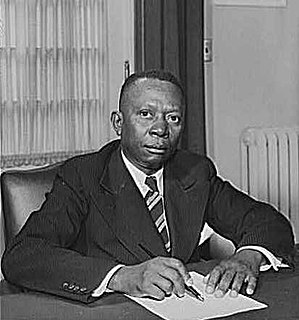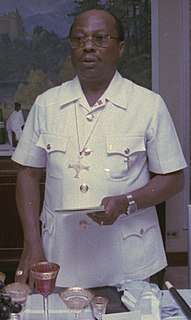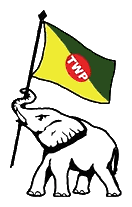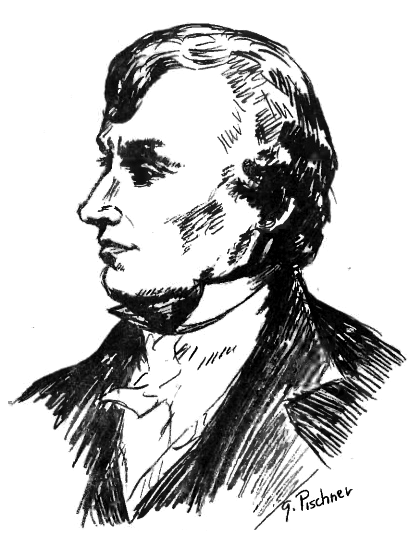
Politics of Liberia takes place in a framework of a presidential representative democratic republic modeled on the government of the United States, whereby the President is the head of state and head of government; unlike the United States, however, Liberia is a unitary state as opposed to a federation and has a pluriform multi-party system rather than the two-party system that characterizes US politics. Executive power is exercised by the government. Legislative power is vested in both the government and the two chambers of the legislature.

The President of the Republic of Liberia is the head of state and government of Liberia. The president serves as the leader of the executive branch and as commander-in-chief of the Armed Forces of Liberia.

William Vacanarat Shadrach Tubman was a Liberian politician. He was the 19th President of Liberia, serving from his election in 1944 until his death in 1971.

Philippine elections are of several types. The president, vice-president, and the senators are elected for a six-year term, while the members of the House of Representatives, governors, vice-governors, members of the Sangguniang Panlalawigan, mayors, vice-mayors, members of the Sangguniang Panlungsod/members of the Sangguniang Bayan, barangay officials, and the members of the Sangguniang Kabataan are elected to serve for a three-year term.

The 2005 Liberian general election was held on 11 October 2005, with a runoff election for the presidency held on 8 November of that year. The presidency, as well as all seats in the House of Representatives and Senate were up for election. The election marked the end of the political transition following Liberia's second civil war and had been stipulated in the Accra Comprehensive Peace Agreement of 2003. Ellen Johnson Sirleaf, former World Bank employee and Liberian finance minister, won the presidential contest and became the first democratically elected female African head of state in January 2006.

The 1997 Liberian general election was held on 19 July 1997 as part of the 1996 peace agreement ending the First Liberian Civil War. The presidency, as well as all seats in the House of Representatives and the Senate were up for election. Voter turnout was around 89%. Former rebel leader Charles Taylor and his National Patriotic Party (NPP) won the election by a substantial margin; Taylor won 75.3% of the vote in the presidential election, whilst the NPP won the same number of votes in the parliamentary election. Taylor was inaugurated as president on 2 August 1997.

General elections were held in Liberia on 15 October 1985. These were the first elections since the 12 April 1980 military coup that brought Samuel Doe to power. During 1984, a new draft Constitutional referendum was approved, which allowed a 58 member civilian and military combined Interim National Assembly, headed by President Samuel Doe. The ban on political parties were lifted and four parties, namely, the President's National Democratic Party of Liberia, Liberian Action Party, Unity Party and Liberia Unification Party were in fray.

The Vice President of the Republic of Liberia is the second-highest executive official in Liberia, and one of only two elected executive offices along with the President. The Vice President is elected on the same ticket with the president to a six-year term. In the event of the death, resignation or removal of the president, the Vice President ascends to the presidency, which he or she holds for the remainder of their predecessor's term. The Vice President also serves as the President of the Senate and may cast a vote in the event of a tie. The current Vice President is Jewel Taylor, serving under President George Weah. She began her term on January 22, 2018.

The 2011 Liberian general election was held on 11 October 2011, with a presidential runoff election held on 8 November 2011. The presidency, as well as all seats in the House of Representatives and half of the seats in the Senate, were up for election. The election was overseen by the National Elections Commission (NEC).

General elections were held in Liberia on 1 May 1951, the first to be held under universal suffrage, as previously only male descendants of Americo-Liberians had been allowed to vote. This was the first elections in Liberia where women and the local Liberians owning property were allowed to vote based on a Constitutional Referendum in 1945–46. In the presidential election, William Tubman of the True Whig Party was the only candidate, and was re-elected unopposed.

General elections were held in Liberia in 1963. In the presidential election, incumbent William Tubman of the True Whig Party was the only candidate, and was re-elected unopposed.

General elections were held in Liberia in 1967. In the presidential election, incumbent William Tubman of the True Whig Party was the only candidate, and was re-elected unopposed.

General elections were held in Liberia on 4 May 1971. In the presidential election, incumbent William Tubman of the True Whig Party was the only candidate, and was re-elected unopposed. In the legislative elections, the True Whig Party won all 52 seats in the House of Representatives.
Frank Emmanuel Tolbert was a Liberian politician and brother of President William R. Tolbert, Jr. The oldest son of William R. Tolbert Sr., national chairman of the ruling True Whig Party, he grew up in Bensonville, attended Zion Praise Baptist Church, graduated from Liberia College, and became involved in politics relatively early in life. As his family became more and more closely connected to the family of Supreme Court Justice William V.S. Tubman, Frank began to become prominent: when Tubman ran for President in 1943, he was rumoured to be Tubman's first choice for Vice President, although his younger brother William was eventually chosen, perhaps because of Frank's unpredictable moods and violent temper.

The 1980 Liberian coup d'état happened on April 12, 1980, when President William Tolbert was overthrown and murdered in a violent coup. The coup was staged by an indigenous Liberian faction of the Armed Forces of Liberia (AFL) under the command of Master Sergeant Samuel Doe. Following a period of transition Doe would go on to rule the country throughout the 1980s until his murder on 9 September 1990 during the First Liberian Civil War.

Edison Reginald “Reggie” Townsend was a Liberian journalist and statesman known for the establishment of Liberia’s Information Services. He served as Secretary of Information and Cultural Affairs under President William V. S. Tubman, and as Minister of State for Presidential Affairs under President William R. Tolbert. In 1979 he was elected National Chairman of the True Whig Party. Following the 1980 Liberian coup d'état of President Tolbert on April 12, 1980, he and several other members of the Tolbert administration were put on trial and without due process executed by firing squad on April 22, 1980.


















